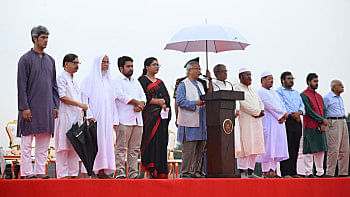Stop hiding behind technicalities

We wholeheartedly support the call of the UN Working Group on Enforced or Involuntary Disappearances that the Bangladesh government needs to shed its lax approach to allegations of enforced disappearances at the hands of security agencies in the country. Five new cases of enforced disappearances were reported to the UN working group in the last one year, taking the number of cases being investigated by the UN to 81. Meanwhile, according to various human rights organisations, at least 522 people became victims of enforced disappearances between 2009 and 2018 in Bangladesh. But the response of the government so far has been wholly unsatisfactory, to say the least.
The government's continued denial is causing any hope for justice, or potential return of the victims of enforced disappearances, to fade away. What's more concerning is its lack of willingness to even investigate such allegations.
Just this Monday, the information minister said that "unfounded" allegations of enforced disappearances are being peddled by "anti-state" groups working against the interests of the country. There is no shortage of such excuses to bin these allegations. Sometimes it is done through counter-accusations against rights groups. Sometimes it is through suspicious claims of "voluntary" disappearances. Oftentimes, it is through straight-faced denial of knowledge. But how long will the government keep obstructing justice in the face of mounting evidence as well as rising calls for fair investigations and establishing accountability of the security agencies?
The just-retired UN High Commissioner for Human Rights, during her recent four-day visit to Bangladesh, also expressed concern regarding the continued allegations of enforced disappearances. She offered her office's help in devising a mechanism of international standards to investigate the allegations. But the government's continued denial is causing any hope for justice, or potential return of the victims, to fade away. What is more concerning is its lack of willingness to even investigate claims of enforced disappearances, which is the least it could do. What does it fear will come out if such investigations are carried out? Why hide behind technicalities every time an accusation is raised?
The focus, however, must not shift from the victims and the struggle of their families. In the past, according to reports by this daily, many families alleged that they were being harassed by the police and coerced into signing pre-written statements "admitting" that they had deliberately misled the authorities by concealing information about their "missing" relatives. This is alarming not only because it could signal the complicity of law enforcement agencies in the cases themselves, but also because it shows that they are doing the very opposite of what they should be doing: protecting citizens.
We demand that the government urgently undertakes an impartial, independent and transparent investigation into all allegations of enforced disappearances. The UN human rights council, in its ongoing 51st regular session, reiterated its call for addressing the allegations and building an independent system of investigation, which the government should have no reason to ignore. The families of all the disappeared deserve better. The government must do everything possible to alleviate their suffering.

 For all latest news, follow The Daily Star's Google News channel.
For all latest news, follow The Daily Star's Google News channel. 







Comments